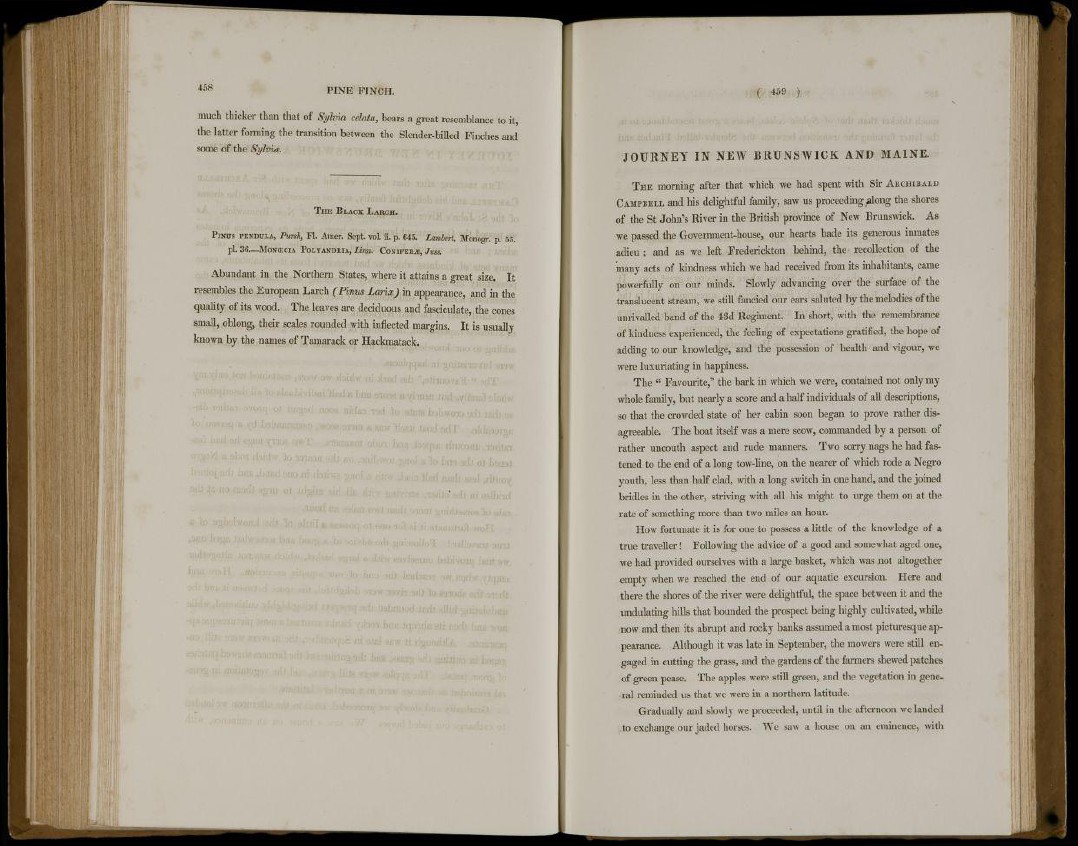
458 PINE FINCH.
much thicker than that of Sylvia celata, bears a great resemblance to it,
the latter forming the transition between the Slender-billed Finches and
some of the Sylvia.
THE BLACK LARCH.
PINUS PENDUXA, Pursh, Fl. Amer. Sept. vol ii. p. 6 4 5 . Lambert, Monogr. p. 55.
pi. 36.—MONCECIA POLYANDRiA, Linn. CONIFERS, JUSS.
Abundant in the Northern States, where it attains a great size. It
resembles the European Larch (Pinus Larix) in appearance, and in the
quality of its wood. The leaves are deciduous and fasciculate, the cones
small, oblong, their scales rounded with inflected margins. It is usually
known by the names of Tamarack or Hackmatack.
( 459 )
J O U R N E Y I N N E W B R U N S W I C K A N D M A I N E .
THE morning after that which we had spent with Sir ARCHIBALD
CAMPBELL and his delightful family, saw us proceeding along the shores
of the St John's River in the British province of New Brunswick. As
we passed the Government-house, our hearts bade its generous inmates
adieu ; and as we left Frederickton behind, the recollection of the
many acts of kindness which we had received from its inhabitants, came
powerfully on our minds. Slowly advancing over the surface of the
translucent stream, we still fancied our ears saluted by the melodies of the
unrivalled band of the 43d Regiment. In short, with the remembrance
of kindness experienced, the feeling of expectations gratified, the hope of
adding to our knowledge, and the possession of health and vigour, we
were luxuriating in happiness.
The " Favourite," the bark in which we were, contained not only my
whole family, but nearly a score and a half individuals of all descriptions,
so that the crowded state of her cabin soon began to prove rather disagreeable.
The boat itself was a mere scow, commanded by a person of
rather uncouth aspect and rude manners. Two sorry nags he had fastened
to the end of a long tow-line, on the nearer of which rode a Negro
youth, less than half clad, with a long switch in one hand, and the joined
bridles in the other, striving with all his might to urge them on at the
rate of something more than two miles an hour.
How fortunate it is for one to possess a little of the knowledge of a
true traveller ! Following the advice of a good and somewhat aged one,
we had provided ourselves with a large basket, which was not altogether
empty when we reached the end of our aquatic excursion. Here and
there the shores of the river were delightful, the space between it and the
undulating hills that bounded the prospect being highly cultivated, while
now and then its abrupt and rocky banks assumed a most picturesque appearance.
Although it was late in September, the mowers were still engaged
in cutting the grass, and the gardens of the farmers shewed patches
of green pease. The apples were still green, and the vegetation in general
reminded us that we were in a northern latitude.
Gradually and slowly we proceeded, until in the afternoon we landed
to exchange our jaded horses. We saw a house on an eminence, with